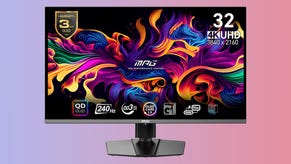AMD Radeon RX 7600 vs Nvidia GeForce RTX 3060 vs Intel Arc A750: the 1080p graphics shoot-out
There's no outright winner in the budget 1080p space... but many strong options.
After the deluge of data, what have we learned? First of all, the more Intel Arc results came in, the more I was drawn to the Arc A750. The idea that these were on sale for $199 at one point is mind-boggling as even at its new retail price of £230/$250, there's strong value here. However, the benchmarks are testing Arc in its proven stomping ground: modern games and modern games with demanding RT features. There are a couple of areas where we can see that Arc is still very much work-in-progress and I believe that's priced in as there are profound limitations the benchmarks don't expose that clearly need to be factored into any purchasing decision.
Firstly, there's the fact that you need a PC that supports resizeable BAR. If you don't have such a platform, just forget Arc completely as the performance hit is too high. Secondly, there's legacy API support and its shakiness on Arc. Intel has been feted for its improvements here, particularly with DX9 titles, but I still think there are profound issues.
As you'll see in the video and screenshots below, I randomly chose three of my favourite DX11 games. Crysis 3 Remastered played beautifully - faster than RTX 3060 except in draw call-heavy scenes where it operates on par. However, Call of Duty: Infinite Warfare consistently crashed within moments of play on the A750. Meanwhile, the terrifyingly poor performance I noted in Assassin's Creed Unity when I first reviewed Arc remains the same right now. If you like older games, I'd say that Arc has to be discounted from consideration as you have no idea if your favourites are going to run well... or run at all. Go to crowd-sourced Reddit threads (assuming they are still online) to see if you're likely to have problems with your favourite legacy games.
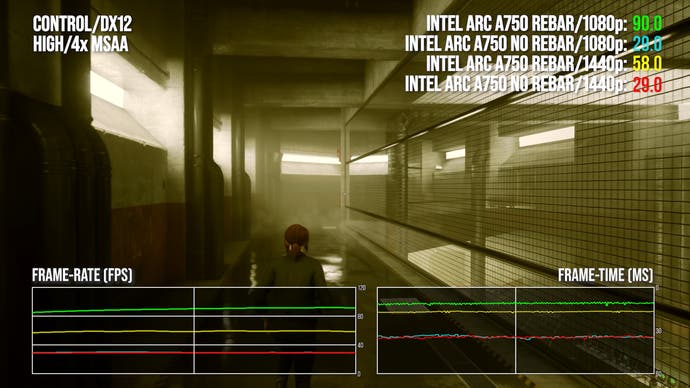
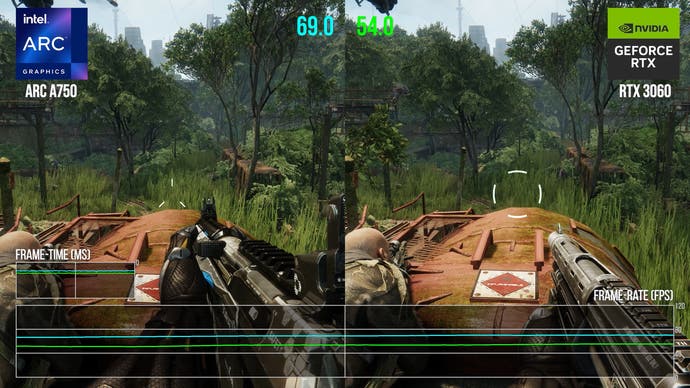
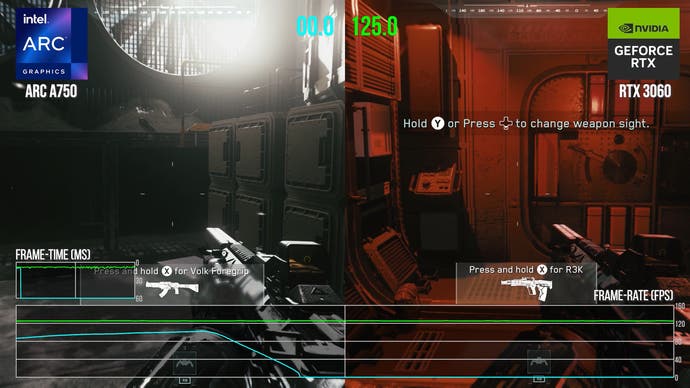
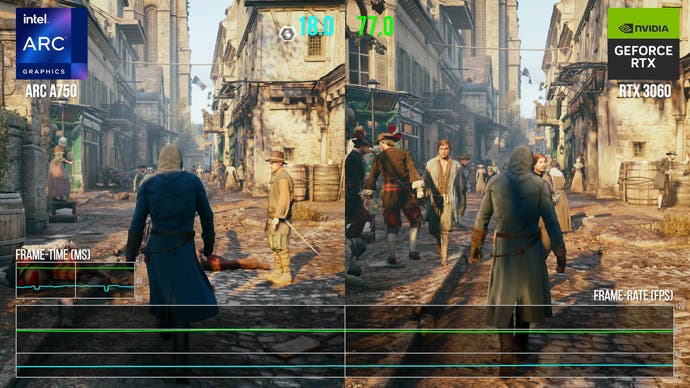
Arc has its charms then, but also stone-cold reasons why you shouldn't even begin considering it, so what other purchasing decisions can I recommend in this volatile period? Well, the results across all of these pages deliver very, very few outright wins for the RTX 3060 12GB. It's beaten in RT by Arc, for the most part. In rasterisation, AMD is well ahead and Arc puts up a good fight. However, assuming the price is right, one might consider the RTX 3060 12GB as a jack of all trades. Rasterisation isn't the best, but it's fine. RT performance isn't as good as Arc, but as we've seen, it's still good enough.
RTX 3060 also has two specific x-factors its rivals don't have. DLSS is the best upscaling solution and works very well on RTX 3060. Secondly, the 12GB of framebuffer memory will likely come in handy sooner rather than later based on all the VRAM disasters we've seen thus far in 2023. A discounted RTX 3060 12GB is a strong contender holistically - just don't go for the 8GB model. If there are further discounts as the RTX 4060 lands, it may well be the case that the 3060 12GB becomes the new card's most potent rival - in exactly the same way that the RX 6650 XT is causing the RX 7600 so many problems.
Speaking of which, there are plenty of reasons to consider an AMD card in the budget range we're looking at today. If you're building a low budget PC where pricing is of paramount importance, the RX 6600 may be the weakest card in our line-up but it is readily available for under £200/$200 and at that money, it is undeniably an excellent contender. Meanwhile, it's a coin-toss between the RX 7600 and RX 6650 XT which are so very similar. You pay a little more for the RX 7600 but typically, you get a little more for your money too. The RX 7600 is a perfectly fine new graphics card - but its value proposition has been demolished by the cut-price GPUs that AMD itself makes. Even so, all of the AMD cards tested today have their merits.
After all of this testing, the conclusion is that there isn't any clear winner which should, in theory, mean that a $299 RTX 4060 has a golden opportunity to deliver something more. Not only will it have the DLSS upscaling tech that adds so much value to the RTX 3060, it'll have DLSS 3 frame generation too. One of the key plus points about the RTX 4060 Ti was how potent frame-gen was in overcoming CPU limitations in affected games - of which there are many this year. Big question marks still surround the 8GB framebuffer memory limit, of course, and right now there are no indepedent figures on just how much more performant the new card is over its all-conquering predecessor.
Should you take advantage of the big price reductions we've seen recently? Well, this article has been a couple of weeks in the making and perhaps ominously, despite the range of excellent value cards I've seen, there doesn't seem to be any massive sales surge, so I think you can possibly afford to wait to see what kind of impact the arrival of the RTX 4060 will make to the market. Maybe Intel will feel compelled to bring A750 down to $199 again? Maybe AMD will respond by dropping prices of its existing inventory even lower? After all, literally on the day the RX 7600 reviews dropped, the MSRP in the US was dropped from its original $299.
It's a buyer's market and I think there's a positive takeaway from this. A lot of these cards were over-priced at launch and now they're offering compelling value at their new price-points. The $330 MSRP of the RX 6600 never made sense to me but at $180-$200, it's well worth considering. Meanwhile, there may not be one all-encompassing budget GPU winner, but the point is that if you favour RT, rasterisation or upscaling or more memory than the 8GB default, you've got options. Excellent options, I'd say, but wait until the 4060 arrives before laying down your money.
The 1080p GPU Shoot-Out
- Introduction
- RT benchmarks: Dying Light 2, Cyberpunk 2077, Control
- RT benchmarks: Hitman 3, Metro Exodus Enhanced Edition, F1 22
- RT/DLSS/FSR2/DLSS3 benchmarks: Cyberpunk 2077, Dying Light 2, Forza Horizon 5
- Game benchmarks: Control, Cyberpunk 2077, F1 22, Forza Horizon 5
- Game benchmarks: Hitman 3, A Plague Tale: Requiem, Returnal
- Conclusions and recommendations [This Page]




